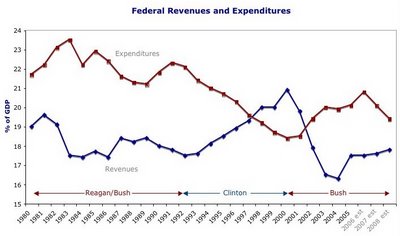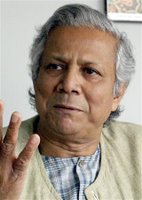Vote Democratic for a Rational Energy Policy
 Today's New York Times has the latest installment in the long sad story of how BushCo has been letting oil and gas companies off the hook when it comes to royalties for energy extracted from publicly owned lands and offshore fields:
Today's New York Times has the latest installment in the long sad story of how BushCo has been letting oil and gas companies off the hook when it comes to royalties for energy extracted from publicly owned lands and offshore fields:The Interior Department has dropped claims that the Chevron Corporation systematically underpaid the government for natural gas produced in the Gulf of Mexico, a decision that could allow energy companies to avoid paying hundreds of millions of dollars in royalties.Remarkably, a group of citizens has to sue to protect the financial interests of the federal government:
The agency had ordered Chevron to pay $6 million in additional royalties but could have sought tens of millions more had it prevailed. The decision also sets a precedent that could make it easier for oil and gas companies to lower the value of what they pump each year from federal property and thus their payments to the government.
Interior officials said on Friday that they had no choice but to drop their order to Chevron because a department appeals board had ruled against auditors in a separate case.
“The government is giving up without a fight,” said Richard T. Dorman, a lawyer representing private citizens suing Chevron over its federal royalty payments. “If this decision is left standing, it would result in the loss of tens of millions, if not hundreds of millions, of dollars in royalties owed by other companies.”I've written before about the various ways our government has to let oil and gas companies extract public energy reserves without paying. The excuses offered for this ongoing boondoggle go to the heart of BushCo's wrong-headed policy of making it easy for energy companies to make money in the hope that consumers will somehow see the benefit.
In another post, I compared the dumb money (subsidies to fossil fuel companies) with the smart money (investing in new energy sources). When it comes to energy policy, BushCo and the Republicans in Congress have sided consistently with the dumb money. Last year's energy monstrosity (which Mike Castle supported) included more than $1 billion to subsidize an energy consortium located in Tom DeLay's hometown.
For those who need a quick refresher in remedial energy economics, there are several basic reasons why BushCo's policy of shoveling tax dollars out the door to fossil fuel companies doesn't work.
First, the planet holds a finite amount of petroleum and natural gas, and subsidizing their extraction won't increase the supply.
Second, the fossil fuel business is already making pretty good money, and hardly need tax dollars as an incentive to do what they are in the business of doing.
Third, as any business school student will tell you, a sound business strategy doesn't invest in a declining business line (dumb money), but uses revenue from the old business line to invest in new opportunities (smart money). That is why most business leaders (like GE's Jeff Imelt) are actually more forward-looking that Bush and Cheney when it comes to energy policy.
If history is any guide, we can expect Republicans to continue their policy of shoveling taxpayer dollars down the fossil fuel rathole. There is one way to ensure that our government invests in our energy future instead of subsidizing our energy past, and that is to elect Democrats to Congress next week.











